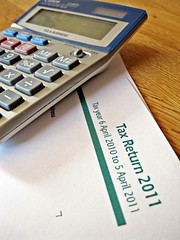5 Small Business Tax Deductions to Take Advantage Of
 Business leaders can minimize taxable profit by taking advantage of tax deductions. The lower your taxable profit at the end of the year, the less you’ll have to pony up in additional taxes. Small business consultant services also recommend tracking deductible spending as a cost-effective method of acquiring top-of-the-line equipment such as laptops, printers, company cars, etc. Such items may seem like personal perks, but they also provide a competitive edge – and they can be written off at the end of the financial year.
Business leaders can minimize taxable profit by taking advantage of tax deductions. The lower your taxable profit at the end of the year, the less you’ll have to pony up in additional taxes. Small business consultant services also recommend tracking deductible spending as a cost-effective method of acquiring top-of-the-line equipment such as laptops, printers, company cars, etc. Such items may seem like personal perks, but they also provide a competitive edge – and they can be written off at the end of the financial year.
Small business bookkeeping services recommend tracking the following five common deductible business expenses.
1. Professional Fees
If you’re unsure of how to track deductible expenses, or if you just don’t have the time to do so, you may choose to hire outsourced accounting services. Small business bookkeeping services can provide suggestions on the easiest, most efficient ways to track business expenses.
If you do hire this kind of small business consultant, be sure to deduct his or her costs, as well. Professional fees, including bookkeeping, consulting fees, accounting and professional dues and subscriptions, may be deducted from a company’s tax responsibility.
2. Mileage and Other Auto-Related Expenses
Most businesses spend a hefty chunk on local transportation, either delivering goods or meeting with clients. Certain types of organizations – such as landscaping and contracting firms – also maintain company cars. The IRS allows businesses to deduct these transportation expenses using one of two methods:
- Track all actual business expenses for each automobile. This technique usually yields more deductions at tax time and is a great approach for those who use a newer car mainly for business.
- Deduct 51 cents per mile driven. Use this approach if you use your vehicle both for business and personal expenses. (This rate changes, so check the current rate at IRS.gov)
Small business bookkeeping services have numerous suggestions on how to track mileage; for instance, you can jot down daily mileage in your Day-Timer. Be sure to include details on how you were using the car for business purposes.
3. Business Meals/Entertainment
Many businesses include wooing clients in their common expenditures. Business meals and entertainment can typically be deducted from your tax liability. Just be sure to track client names and topics covered for each expense. One small business consultant method for tracking these costs is to write notes on the receipt and attach the receipt to a company form with more spending details.
4. Education and Training
To get all of the details on deducting business education and training expenses, be sure to read IRS publication 970, “Business Deductions for Work-Related Education.”
In general, you are allowed to deduct employee education costs if classes sustain or improve job-related abilities.
5. Equipment Deductions
Outsourced accounting services ensure that their clients deduct business equipment costs. If you purchase a phone, laptop, printer or any other piece of equipment for your business, chances are it can be deducted.
[photo by: Images_of_Money, on Flickr, via CC License]
About the Author Barb Fisher
Barb is the CEO of Fisher Bookkeeping, an outsourced bookkeeping consultancy that provides small businesses with a full-service financial department. Her favorite aspect of work is to break down the accounting to meaningful bits, so entrepreneurs can make a powerful difference in their own business. She's also a power lifter (squat: 215, DL: 270).
Related Posts
Where Did My Money Go? Part Two: Examining Your P&L Report
Where Did My Money Go? Part 1: Protect Your Small Business Cash Flow
Are Professional Bookkeeping Services Essential For My Business?
4 Ways the Profit First Method Helps You Reach Your Financial Goals
